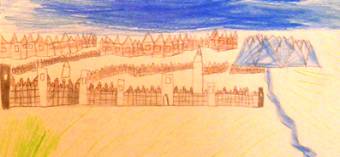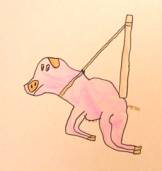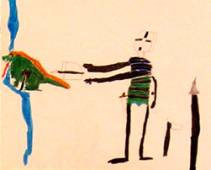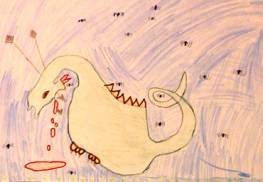THE
LEGEND OF BABAU
Once upon a time there was a town called Rivesaltes. It was surrounded by a great wall. There were two wells which enabled the townspeople to have drinking water. The women went down to the river to wash the clothes. They had built a mill and an oven.

The wall had a hole near the oven from which they threw out the rubbish. This hole was called the oven hole. One night, the townspeople felt as if the earth were trembling. The children cried. Suddenly the silence returned. The people went out of their homes. Some children had disappeared. The whole town was on the watch out. The oven hole seemed larger. For two nights, Rivesaltes slept calmly. The townspeople heard nothing but the cats meowing. Suddenly, on the third night, it came back. The stones were thrown up into the air. Two houses were visited. No children died that night, but the townspeople found two dead rabbits in the middle of the street. The townspeople had seen the monster that lived in the river. He had left huge claw tracks when he went. The guards thought that he had looked like a huge lizard. His green body was covered with scales and their arrows had bounced off his skin. It seemed like the monster whose story they told around the fire at night: the Romanian monster Bau-Bau. This is how he came to be known as Babau.

On the third day, Babau emerged from the water. The monster threw himself at the pig. Galdric aimed an arrow at his neck and the guards threw boiling water over him. Babau, wounded and furious, returned to the river.


A few days later, some of the locals said they had found a dead monster not far away, next to the water. They sent men out to check that it was the monster. They brought back one of his bones to show the townspeople. The town organised a huge party to celebrate the death of Babau. Every August since then, Rivesaltes celebrates the death of Babau.

